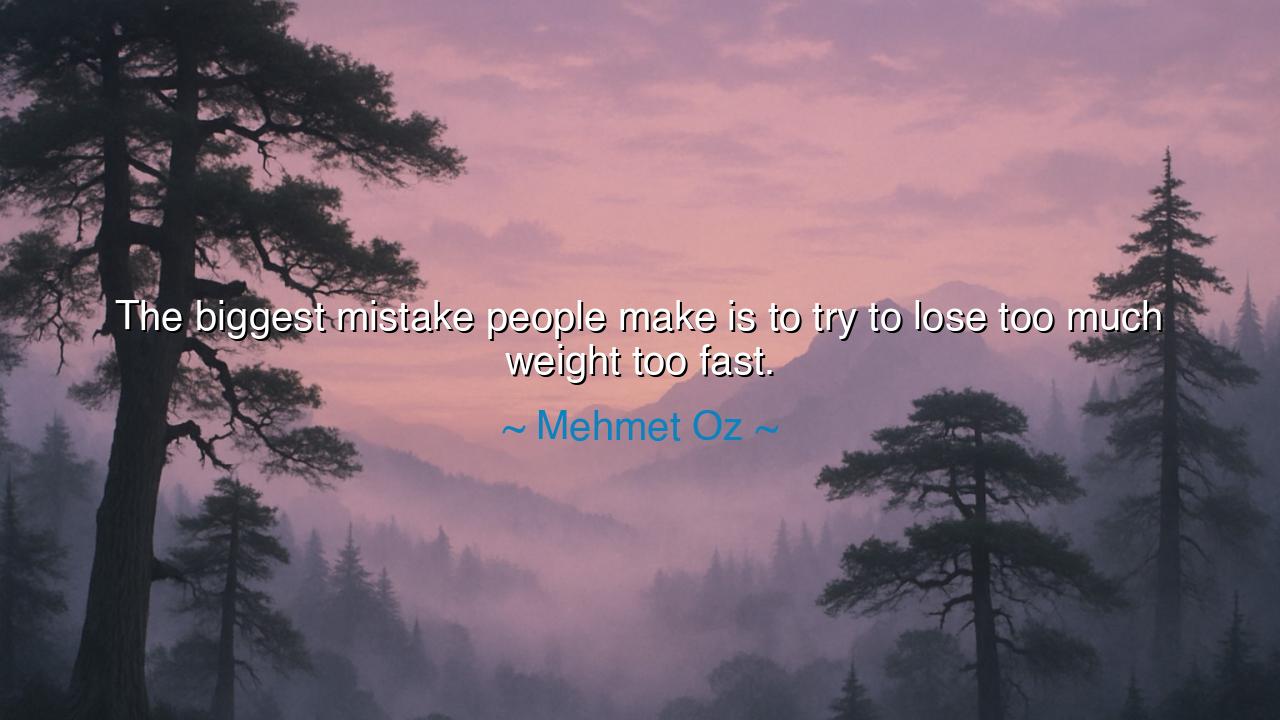
The biggest mistake people make is to try to lose too much weight






The words of Mehmet Oz, “The biggest mistake people make is to try to lose too much weight too fast,” are more than a warning about the body—they are a reflection on the human condition. Beneath the language of health lies a universal truth: that lasting transformation, whether of the flesh, the mind, or the spirit, can never be achieved through haste. Dr. Oz, a physician who has studied both the science of medicine and the frailty of human will, reminds us that the body, like the soul, thrives not in violent change but in discipline, patience, and harmony with time.
The origin of this quote lies in Dr. Oz’s long work as a surgeon and wellness advocate, where he witnessed the tragedy of human impatience—the desire for miracles without labor, for results without endurance. He saw that those who rushed to lose weight, driven by vanity or despair, often did more harm than good. Their health would crumble beneath the weight of deprivation, and their spirits would falter when the body rebelled. Thus he spoke not only as a doctor, but as a moral teacher: true health cannot be stolen from time; it must be earned through steadiness of purpose.
To understand his meaning fully, one must look beyond the surface. For “losing weight too fast” is not merely about diets and numbers—it is the metaphor for all forms of impatient striving. Men and women in every age have sought quick victories over the long road of mastery. They have chased wealth without work, wisdom without reflection, peace without forgiveness. And in every age, they have paid the same price: the exhaustion of the spirit. As the ancients said, “The tree that grows too fast bears no lasting fruit.” Dr. Oz speaks that same wisdom for the modern world, clothed in the language of health.
Consider the story of Florence Griffith-Joyner, known to the world as “Flo-Jo,” the fastest woman of her time. Her rise was meteoric, her strength radiant—but her pace, both in competition and in life, burned like a flame that consumed itself. Her dazzling glory was brief, for the body cannot sustain the fury of relentless strain. Her tale is a living echo of Dr. Oz’s teaching: that the quest for rapid triumph may dazzle the eye, but only measured progress nourishes the soul. The steady rhythm of patience outlasts the storm of desire.
In the wisdom of health, as in the wisdom of life, balance is the law of endurance. The body is not a machine to be forced—it is a living temple that responds to gentleness and constancy. The one who seeks to lose too much too fast, whether weight or burden, forgets that the body changes only when the mind learns peace. Health is not a battle to be won but a relationship to be nurtured. It grows in the small choices—the morning walk, the mindful meal, the moment of rest. It is in these quiet rituals that true strength is built, unseen but unshakable.
Dr. Oz’s teaching mirrors the great principle found in every philosophy of the ancients: that virtue and vitality arise from moderation. The Buddha spoke of the Middle Way—the path between indulgence and denial. The Greeks called it sophrosyne, the art of balance and self-restraint. And the wise of every age have known that excess, even in goodness, leads to ruin. To demand too much of the body is to forget its sacred rhythm; to rush toward perfection is to lose the grace of becoming.
The lesson, then, is simple yet profound: walk slowly, but never stop. Whether in health, in love, or in the pursuit of wisdom, let progress be guided by patience, not pride. Do not chase the illusion of instant change, for what comes swiftly leaves swiftly. Instead, honor your journey with small, faithful steps. Let each day’s effort be a prayer to endurance, and let each victory, however small, strengthen your trust in time.
And so, remember this truth as ancient as life itself: the strongest transformation is born of patience, not speed. The body and soul, when treated with care, will blossom like a tree that endures all seasons—its roots deep, its fruits abundant, and its beauty lasting. For in the quiet rhythm of steady effort lies the secret of all health, all happiness, and all human greatness.






AAdministratorAdministrator
Welcome, honored guests. Please leave a comment, we will respond soon